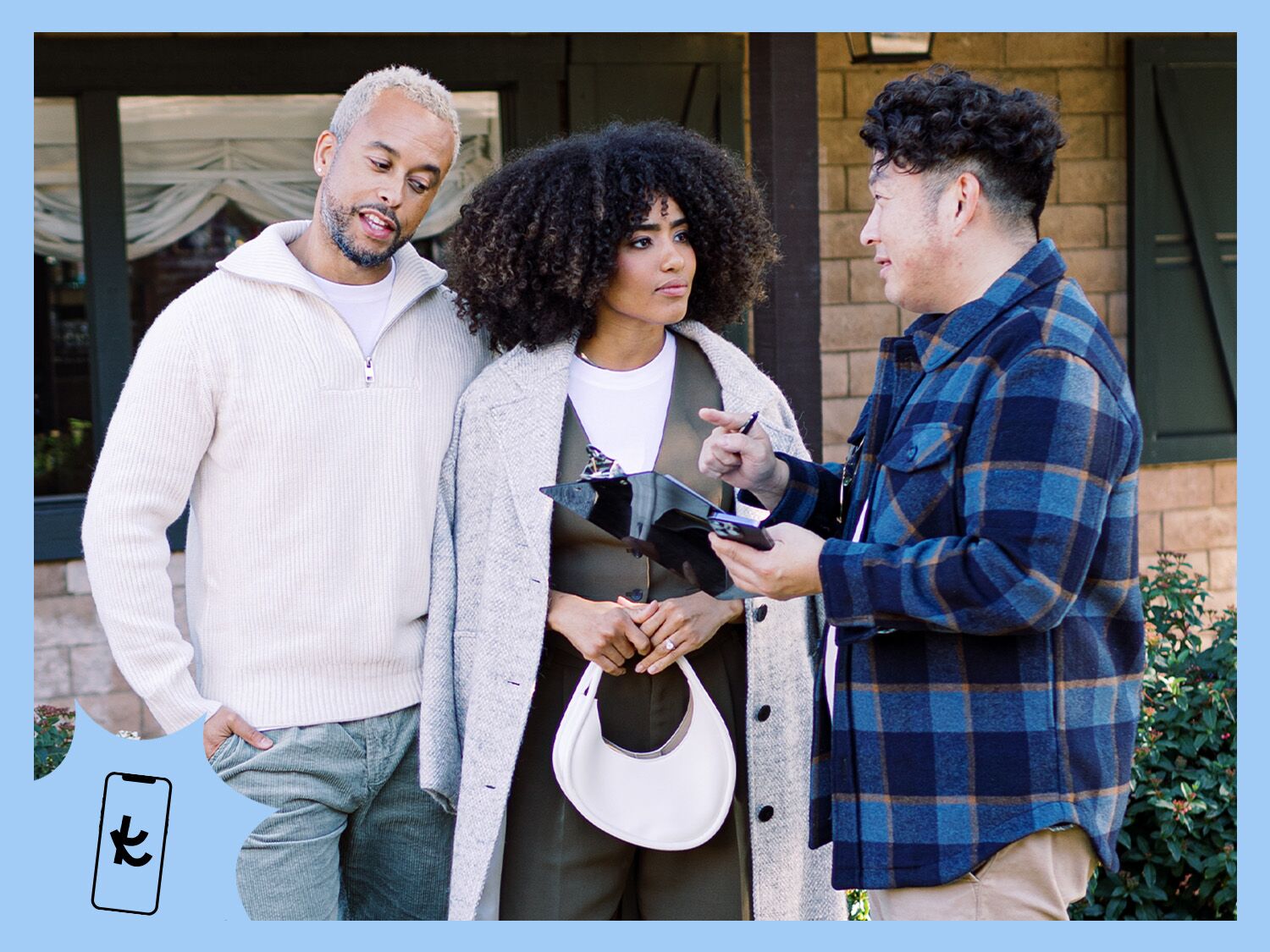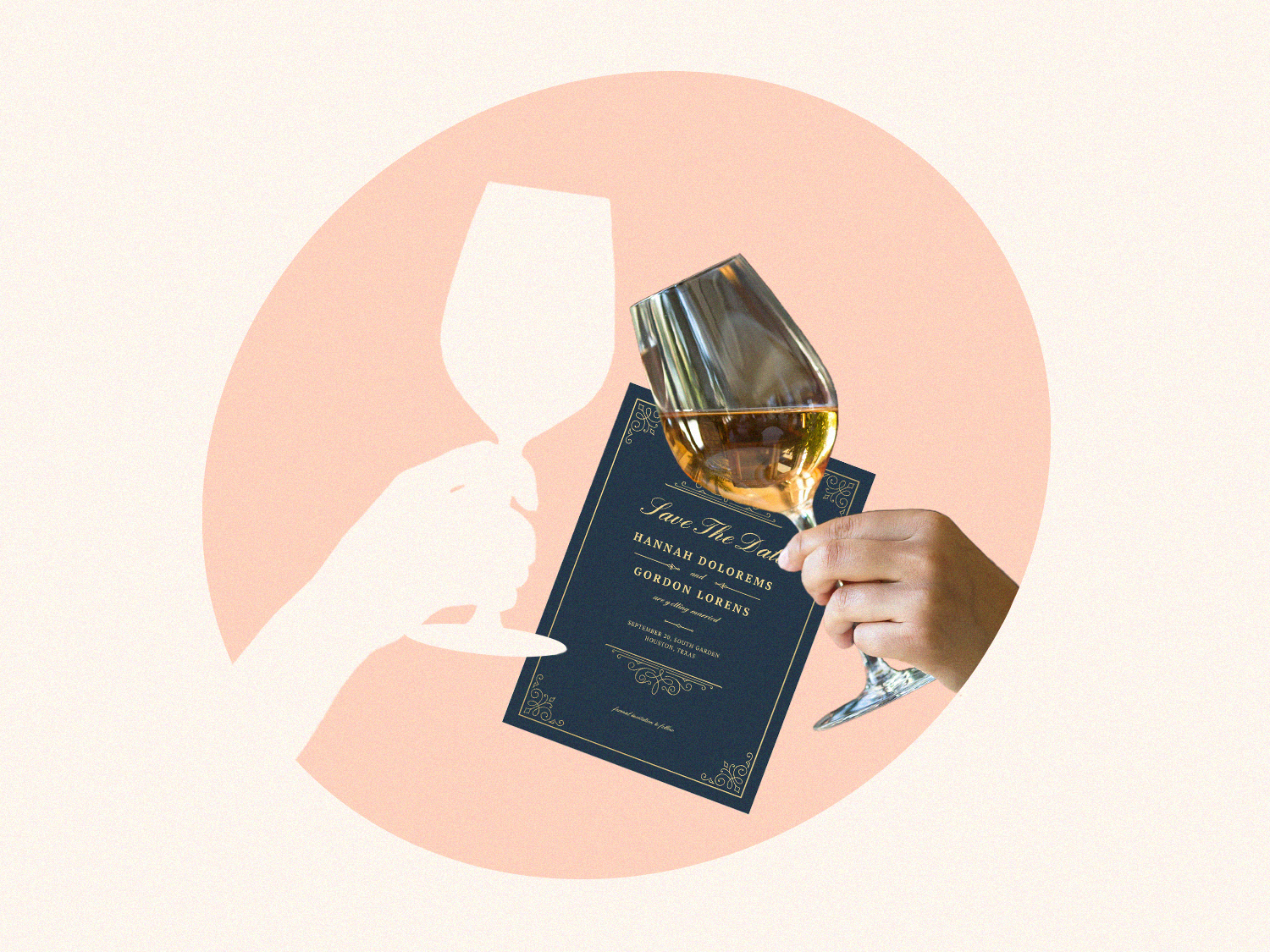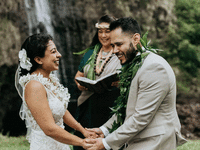Everything You Need to Know About Planning a Courthouse Wedding
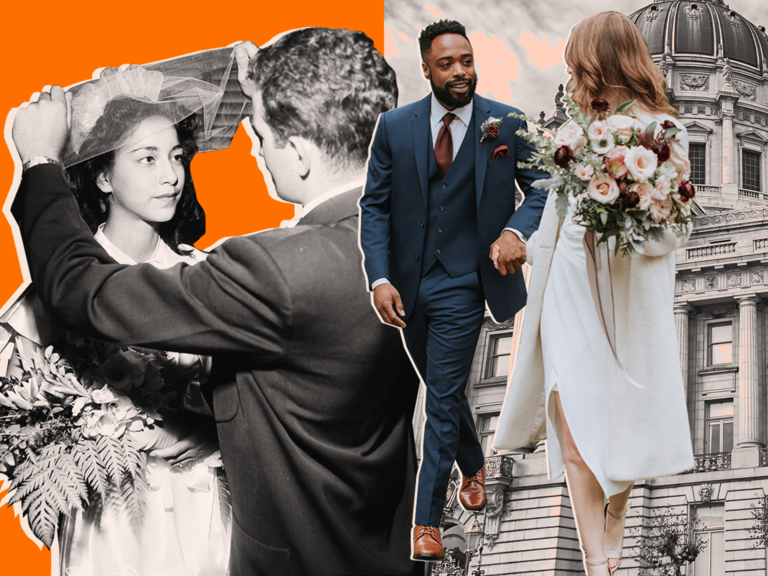
If you're anything like us, you know that a courthouse wedding is just as special as any larger, more formal wedding. In fact, there's something extra-romantic about getting married at the courthouse without all of the bells and whistles—it puts an even bigger focus on the special bond between you and your partner. Whether you've decided to have your wedding at a courthouse to save money on your budget or simply because you'd rather avoid the planning that goes into a big wedding, there are several logistics about courthouse weddings to know. We're here to help you sort it all out, along with tips and advice from a professional wedding planner.
In this article:
What Is a Courthouse Wedding?
A courthouse wedding is a wedding ceremony that takes place at a county or state courthouse, city hall or other municipal building. The civil ceremony is performed by a government official, such as a judge, district clerk, public notary or justice of the peace.
Courthouse weddings tend to be more impromptu and simplistic compared to other weddings. And because the guest list is usually smaller than average, courthouse weddings are a popular option for couples on a budget. "If you're looking for a budget-savvy option that is way less stressful than planning a full wedding, look no further," says Belinda Lau, CEO and lead planner of Opus Events Co., a Los Angeles-based wedding planning company that specializes in sustainable events and elopements. "You'll save a ton of money by not having to pay for a venue, rentals, decor, and staff. You can always host a reception at a nearby restaurant after (brunch or dinner, anyone?) or even later down the line."
Planning to elope at the courthouse? Keep in mind that legal requirements and marriage license application times vary by state, so you may need to wait a few days or weeks before everything is official. "If you're looking for a last-minute legal ceremony and don't have the luxury of a month to plan your courthouse wedding, consider hiring a professional planner who specializes in elopements or pop-up ceremonies," says Lau. "They'll be able to navigate the logistics of getting married right away."
How to Plan a Courthouse Wedding
You're just a few steps away from bringing your courthouse wedding to life. Use this list to keep track of your biggest to-dos, including choosing a venue and building your potential guest list.
1. Choose a wedding date and your courthouse venue.
When you're choosing a date for your courthouse wedding, the good news is that you don't need to plan too far in advance—only a few weeks or months at most. In some states, you can even get married on the same day that your marriage license is approved, if you're feeling spontaneous. The most important thing to remember is that many courthouses are only available for wedding ceremonies Monday through Friday and may only perform weddings at a specific time of day, depending on when the clerk or judge is available. If you already have a particular date and location in mind, pay close attention to the courthouse's hours and availability before making any other decisions.
Speaking of venues, one great thing about getting married at a courthouse is that you won't have to go very far at all to get married—in most cases, you won't even have to leave the county where you reside. Depending on where you live, you can get married at your local district courthouse, state courthouse, city hall or any other municipal building where a judge or clerk performs civil marriage ceremonies. Easily search for and compare courthouse wedding venues near you by using The Knot Vendor Marketplace, where you can filter venes by type and location. Some famous courthouse wedding venues are worth going out of your way, like New York City Hall, the iconic San Francisco City Hall or the Santa Barbara Courthouse, which is famous for its clock tower and beautiful gardens. Before deciding to hold a destination courthouse wedding, look into the specific residential requirements and keep in mind that you'll need to file a marriage certificate with your local bureau once you're married.
2. Double-check the necessary documents and other requirements.
Courthouse weddings don't have as many moving parts as larger weddings, but you still need to set aside time to do a bit of planning. "Make sure to research your county's legal requirements to get married and build a realistic expectation of the timeline," Lau says. Once you've chosen your wedding date and venue, research the county and state requirements to figure out how to apply for a marriage license. In most cases, you and your partner will each need to provide a few forms of identification (like an official birth certificate, passport or driver's license) and pay a fee, so it's wise to start gathering everything sooner rather than later. Depending on the court, you might need an appointment for your marriage license application, ceremony or both. Even if walk-ins are allowed, it's a good idea to make an appointment anyway so you have your spot secured.
3. Hire a photographer (and other vendors as desired).
Hiring a complete list of wedding vendors for your courthouse ceremony isn't necessary, but there are still a few that we recommend working with to make the most of your day. Number one? A professional courthouse wedding photographer is always worth the investment, because they'll capture all of the little moments that you want to remember for the rest of your lives.
"Documenting your big day is important and if you're planning a weekday ceremony, you might have the opportunity to work with some amazing photographers who might otherwise be booked on a weekend," says Lau. As for your officiant, the courthouse will provide someone who's legally certified to perform marriages, but if you want to hire your own wedding officiant, it would be an added cost. (Just confirm with the courthouse ahead of time that you're allowed to bring an outside officiant.)
Treating yourself to a new outfit or a little prewedding pampering are other options. "If your budget allows, also consider getting personal flowers and professional hair and makeup services," Lau says. Finally, consider splurging on a luxury car rental or hiring professional transportation to get to and from the courthouse in style.
4. Create your guest list.
First things first: Decide if you want to invite loved ones at all, or if you'd rather keep the ceremony between just you and your partner—either way, the decision is entirely up to you. "I have some couples who end up inviting no one so they can have an intimate experience and forgo the drama of a guest list," says Lau. "Take the time to thoughtfully discuss the guest list together, and my best advice is to make sure you are both on the same page the whole time." Start your guest list with your VIPs, like parents, siblings and best friends. Depending on how many people you're able to invite, extended family and plus-ones might not make the final cut. Lau points out that you can always hold a larger reception after the ceremony, so there's less pressure to invite everyone to the courthouse.
Unlike standard wedding ceremonies, you're much more limited in the number of guests you can invite to a courthouse wedding. The guidelines vary by location, so check your courthouse's rules carefully. For example, Lau says that some courthouses in Los Angeles allow up to 25 guests, but smaller clerks' offices and district courts may only allow you to bring one or two people. If you're inviting more than a handful of people, stay organized by using a guest list manager to collect addresses, contact information and RSVPs in one place.
5. Build your wedding website and send invitations.
If it's just you and your partner eloping at the courthouse, you probably don't need to put effort into making a wedding website or sending invitations (although you can send wedding announcements after you're married!). But if you're planning a courthouse wedding with a few dozen guests, spread the word by sending invitations to the people you absolutely want in attendance. On the invites, include a link to your wedding website where you can outline important details like instructions for courthouse parking, the room where the ceremony will be held and whether or not you'll be celebrating with a reception. On your website, you can also add a small wedding registry or cash fund for guests who want to give gifts.
6. Pick out your attire.
You may be having a small wedding, but that doesn't mean you can't get in on the fun of wearing an amazing outfit. The rules around courthouse wedding attire are much more relaxed compared to other weddings, which means it's a great time to branch out with non-traditional looks and fun accessories. Pair your courthouse wedding dress with a statement cape or hat, or wear a shorter hemline that shows off your favorite pair of shoes à la Carrie Bradshaw. In general, you don't need to go all-out with black-tie attire for a simple courthouse wedding (unless that's your thing), but you do want to choose something that's a little fancier than your everyday wardrobe.
7. Plan an optional post-ceremony celebration.
Love the idea of leaving the courthouse as newlyweds and then meeting up with your loved ones to celebrate? Keep the party going by planning a get-together or informal reception following your ceremony. It can be as relaxed or unique as you want—rent a private room at your favorite restaurant, host a catered party in a friend's backyard or charter a private yacht for dinner and a sunset cruise. By choosing an interesting venue, you can get around the need for elaborate decor (but small flower centerpieces and candles can work wonders to quickly transform a space). Start planning a few weeks in advance to give yourself enough time to find any necessary vendors and for your guests to make arrangements.
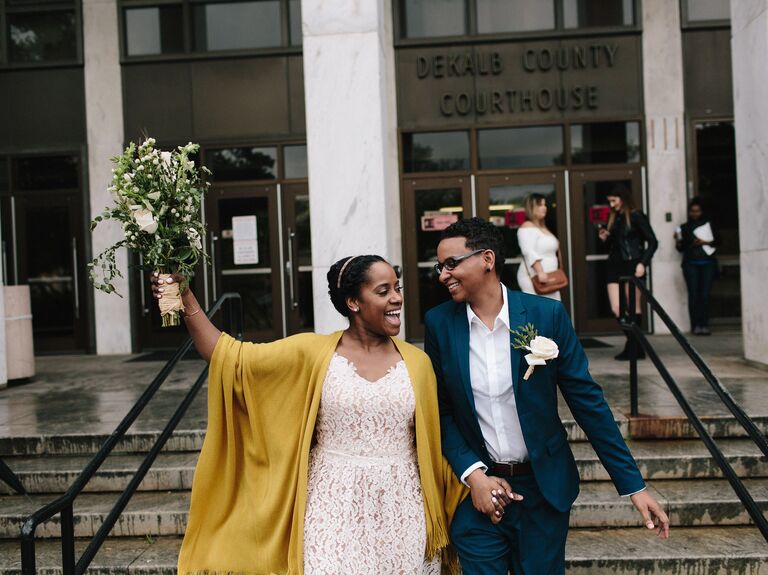
Courthouse Wedding Etiquette: Frequently Asked Questions
If you still have questions about getting married at the courthouse, we've got answers. Here are a few final tips and things to keep in mind.
Can you get married at your local courthouse?
Yes, you can get married at your local courthouse, but it's important to confirm that the courthouse performs weddings at that location before making any arrangements. Not all courthouses have judges or officials who can perform legal marriage ceremonies, and in that case, you may need to travel to another city or county in order to have a courthouse wedding.
How much does it cost to have a courthouse wedding?
Courthouse wedding costs vary by county and state, but in total, it shouldn't be more than a few hundred dollars. You can expect to pay a fee for your marriage license application, in addition to paying a fee for the judge, clerk or justice of the peace who's presiding over the ceremony. Additional vendors and services (like photography) will bump up the cost of your courthouse wedding.
Do you need a witness for a courthouse wedding?
Depending on where you're getting married, you might need at least one or two witnesses for your courthouse wedding, but the legal requirements are different in every state. Consult your local marriage bureau to find out how many witnesses (if any) must be present, and whether they're required to sign your marriage certificate. If you're not able to provide your own witnesses, most courthouses can provide them for a fee.
Do you need an appointment for a courthouse wedding?
In some locations, you'll need a courthouse wedding appointment, but it's different for every court. Check your local courthouse guidelines to determine if you need an appointment, if walk-ins are accepted and whether there are blackout times or days of the week when weddings aren't performed.
How many guests can attend a courthouse wedding?
Consult the office or website directly to find out exactly how many guests can attend the courthouse wedding. The answer will depend on the size and availability of the courthouse. For example, a small district court that only accepts walk-ins may not permit more than one or two guests due to limited floor space and capacity. Some larger courthouses will allow a few dozen guests if you reserved the space and made the necessary arrangements in advance.
How long is a courthouse wedding?
A courthouse wedding ceremony is generally no more than 10 or 15 minutes and can be as short as 5 minutes, depending on your preferences and the legal requirements. In addition to completing paperwork before and after the ceremony, be prepared to spend some time waiting for your turn, either in the same room with other couples or just outside of the room.
Do you say vows at a courthouse wedding?
You'll exchange brief vows as part of your courthouse wedding ceremony. Unless you want to write your own vows, the judge or clerk will read a set of secular, non-religious vows for you to recite—and before you know it, you'll be officially married!

